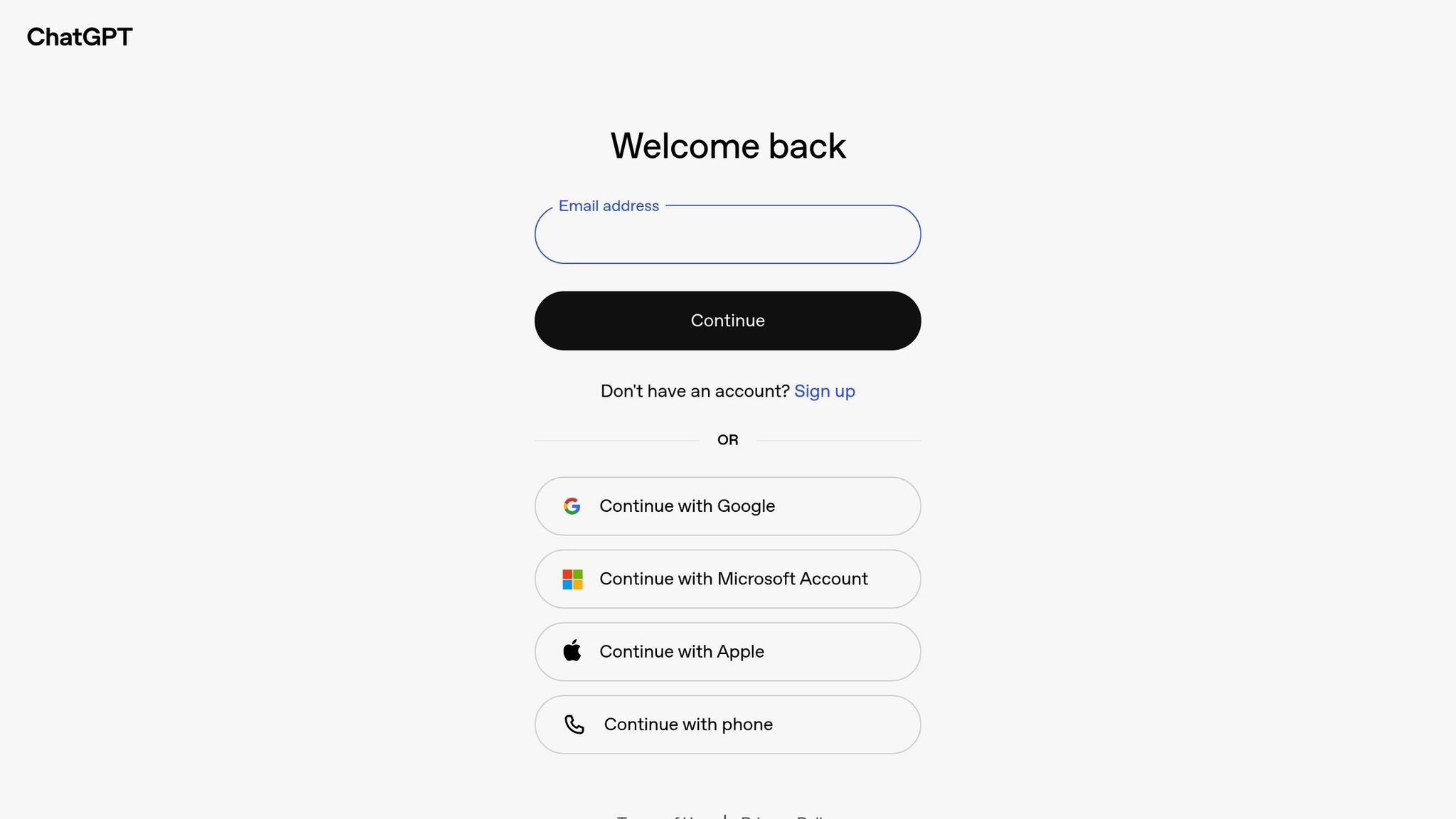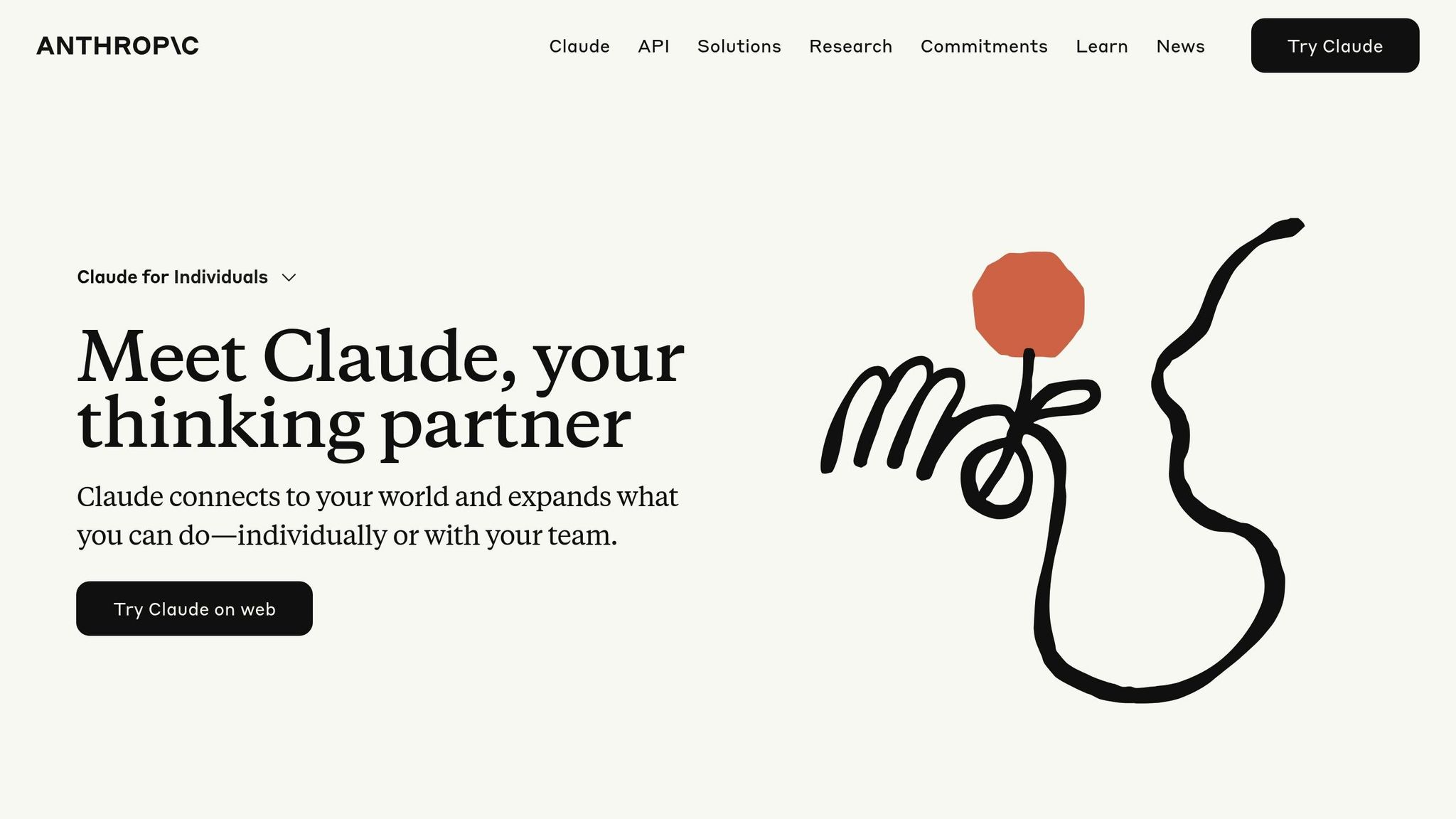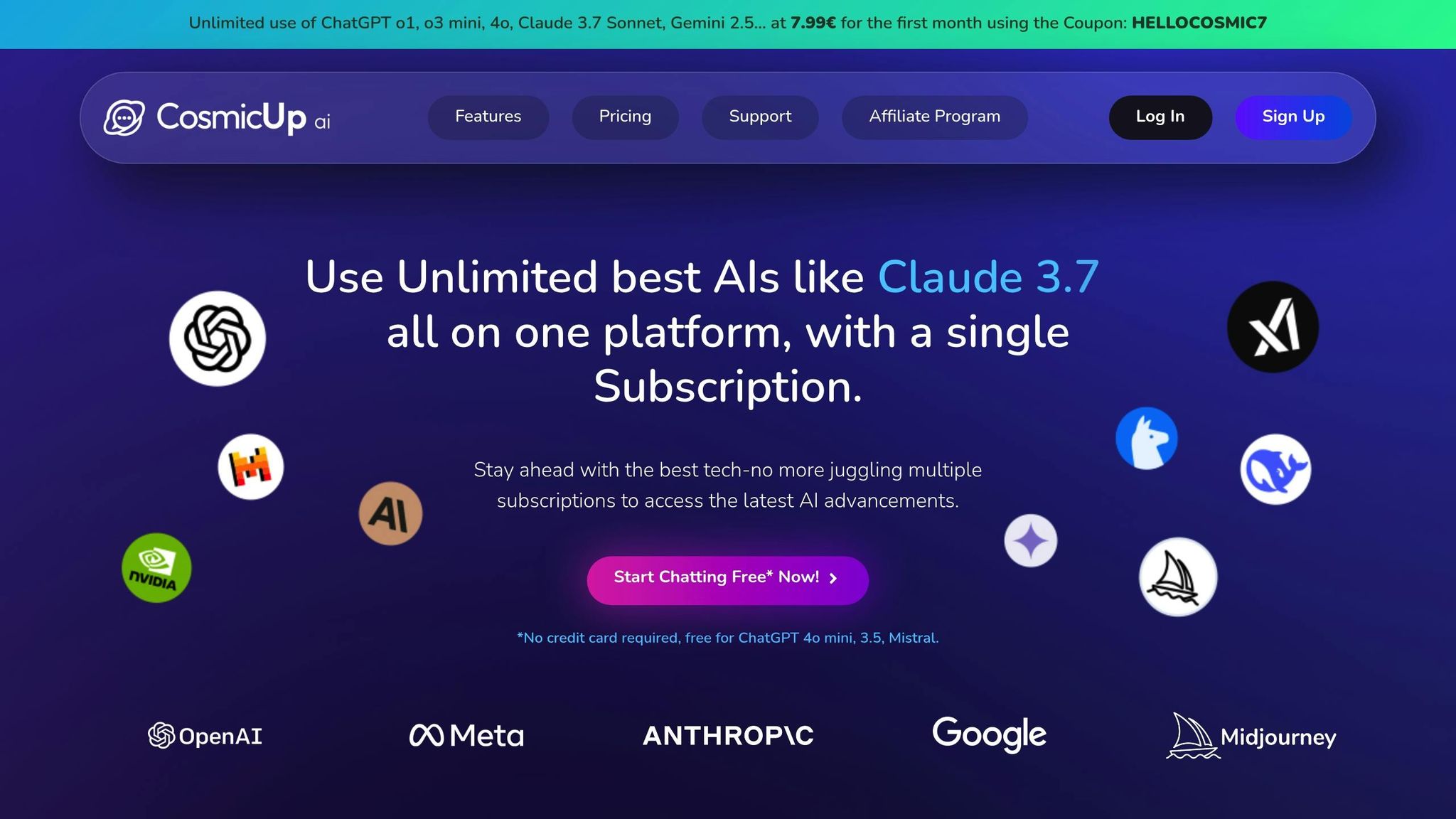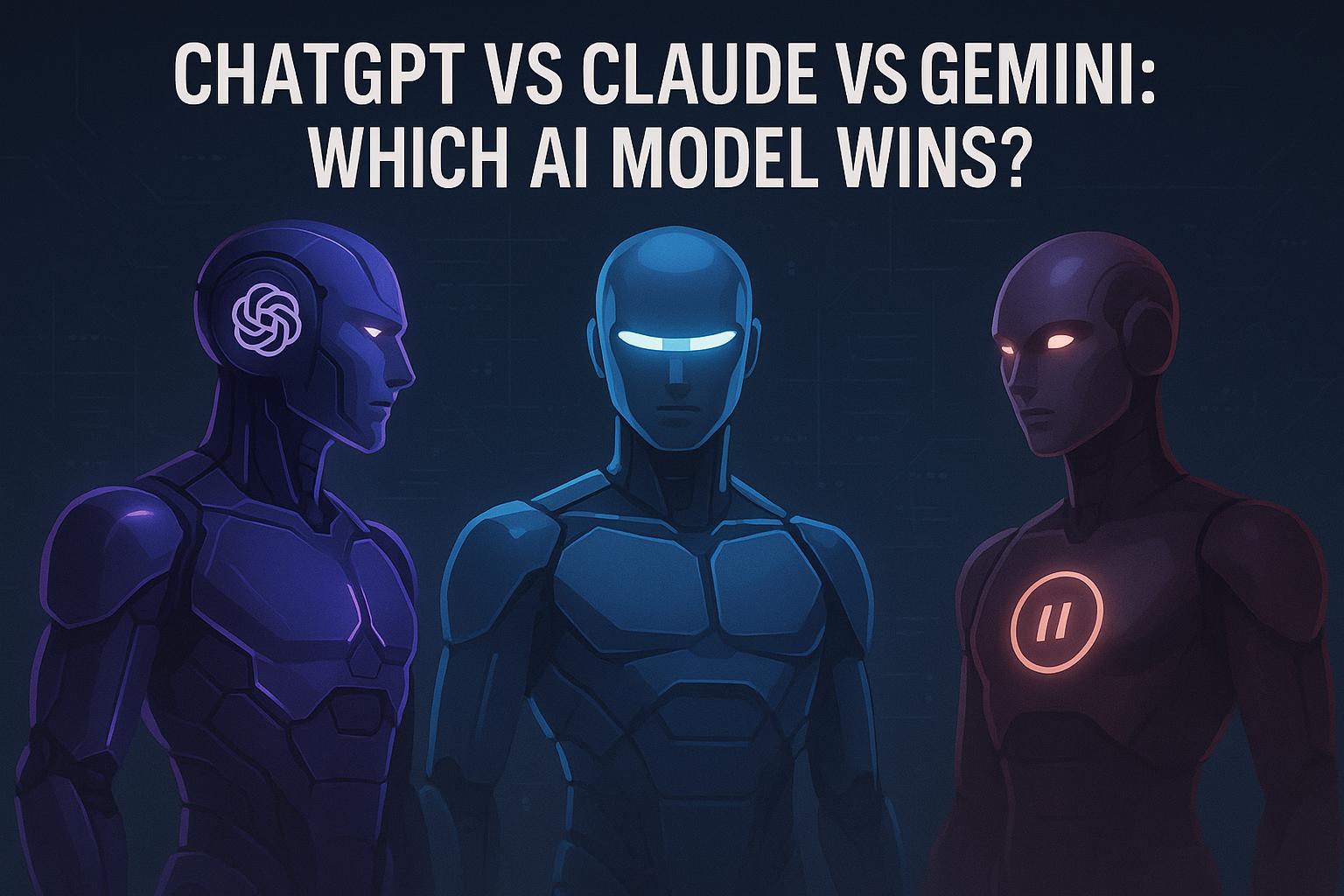Which AI model is best? It depends on your needs. Here’s a quick breakdown:
- ChatGPT: Great for generating ideas, writing, and coding. Offers a conversational tone and flexibility for various tasks but struggles with real-time updates and interpreting humor.
- Claude: Strong in logical reasoning, document analysis, and compliance-focused tasks. Handles large text inputs but can be overly cautious or generic in responses.
- Gemini: Excels in speed, real-time data, and Google app integration. Perfect for research and workflows but less refined in tone and prone to occasional inaccuracies.
Quick Comparison
| Feature | ChatGPT | Claude | Gemini |
|---|---|---|---|
| Best For | Writing, coding, marketing | Research, compliance tasks | Real-time data, Google tools |
| Speed | Moderate | Moderate | Fast (370+ tokens/sec) |
| Token Limit | 25,000 | 200,000 | 1 million |
| Real-Time Data | No | Yes | Yes |
| Integration | Moderate | Limited | Deep with Google apps |
| Price | $20/month (Pro) | $20/month (Pro) | Variable (Google One Premium) |
Conclusion: Use ChatGPT for creative tasks, Claude for structured reasoning, and Gemini for speed and real-time workflows. Tools like CosmicUp simplify access to all three, letting you switch models as needed for the task at hand.
ChatGPT: Strengths, Weaknesses, and Best Use Cases

Main Strengths
ChatGPT shines when it comes to generating creative content and processing natural language. With its massive 175 billion parameter base[5], it can produce responses that feel natural and context-aware, making it a go-to tool for content creation, coding, and even managing complex workflows. Its conversational style allows it to adapt seamlessly to both personal and professional needs.
One of its standout abilities is assisting content creators. It can help generate blog posts, articles, social media updates, and even code snippets[2][3]. Unlike traditional search engines that simply provide links, ChatGPT synthesizes information from various sources and presents it in a conversational format, making it easier to understand and use[3]. It also demonstrates improved context comprehension and reduced biases compared to earlier AI models, which enhances its reliability in many scenarios[4].
However, like any tool, ChatGPT has its limitations, which can influence its effectiveness in certain settings.
Weaknesses
One of the most notable issues with ChatGPT is "hallucination", where it may generate content that sounds convincing but is factually incorrect[6]. Its inability to access real-time information due to a training data cutoff further limits its usefulness for delivering up-to-the-minute updates[7].
The model also struggles with interpreting sarcasm and humor, often missing the nuances of these forms of communication. Additionally, biases present in its training data can lead to biased or even discriminatory outputs[8]. Other challenges include difficulties in managing long-form or highly structured content, juggling multiple tasks at once, and being overly sensitive to typos or grammatical mistakes[8].
These limitations highlight the importance of understanding where ChatGPT excels and where it might fall short.
Best Use Cases
ChatGPT’s creative and linguistic strengths make it an excellent tool for brainstorming, drafting professional communications, simplifying complex topics, and assisting with coding. Writers, marketers, and content creators often rely on it to generate fresh ideas, create initial drafts, and overcome creative blocks. It’s particularly useful for crafting story outlines, brainstorming prompts, and writing realistic character dialogue[10].
In the business world, ChatGPT boosts productivity by helping with tasks like drafting concise emails, summarizing dense information, creating prioritized to-do lists, and breaking down long-term goals into actionable steps[9]. It’s also a valuable resource for programmers, offering code suggestions, debugging assistance, and even teaching coding basics to beginners[10].
Its impact is undeniable – companies using AI-driven tools like ChatGPT have reported up to an 80% increase in content productivity, showcasing its potential to transform workflows[11].
ChatGPT vs Claude vs Gemini: The Best AI for Each Use Case in 2025

Claude: Strengths, Weaknesses, and Best Use Cases
Claude stands out by offering a different balance of performance and safety compared to ChatGPT, leveraging its unique approach to deliver thoughtful and precise outputs.
Main Strengths
Claude employs a constitutional AI framework, which emphasizes logical, step-by-step reasoning while actively minimizing harm and bias [12]. This makes it particularly useful for professionals who require well-reasoned, reliable outputs.
Its coding capabilities are impressive, with a 92% HumanEval score and accurate, modern routing in integration tests [13]. This focus on current best practices positions Claude as a strong choice for developers tackling complex projects.
Another key advantage is its ability to handle extensive text processing. Claude can process over 70,000 words – or up to 200,000 tokens in the Claude 3.7 Sonnet version – far surpassing ChatGPT-4’s 25,000-token limit [15][18]. This makes it an excellent tool for lengthy documentation and in-depth research.
Claude also excels in real-time data processing, offering updates on current events and the latest developments [18]. Combined with its enhanced numeric reasoning and improved multi-step inference capabilities [18], it’s particularly effective for analytical and research-driven tasks.
Weaknesses
Despite its strengths, Claude has some limitations. Its strict safety protocols can sometimes lead to overly cautious or filtered responses, which may lack depth [14].
Additionally, Claude’s performance heavily depends on the quality of the input it receives. Poorly structured, ambiguous, or incomplete prompts can result in less accurate or contextually relevant answers [14]. In highly complex scenarios, it may occasionally miss contextual nuances, producing generic or overly simplified responses [14]. Its performance can also vary when dealing with niche or highly specialized topics due to gaps in its training data [14].
Best Use Cases
Claude’s ability to summarize intricate topics and process large volumes of text makes it an ideal tool for research and knowledge management.
In software development and debugging, Claude shines by identifying subtle errors and providing clear, step-by-step fixes [16].
"ChatGPT-4o is optimized for real-time responses, multimodal inputs, and coding assistance. Claude 3.5 focuses on deep reasoning, structured outputs, and extended memory for long-form content and research."
- Tactiq.io [17]
Claude also performs well in content editing and refinement, offering suggestions to improve grammar, flow, and overall impact while preserving the original intent. For professionals needing in-depth, thoughtful analysis rather than quick creative outputs, Claude’s methodical approach is a standout feature.
Finally, Claude is particularly effective for multi-step logical tasks where clear and verifiable reasoning is critical. Business analysts, consultants, and researchers benefit from its ability to break down complex problems into manageable parts while maintaining logical consistency throughout the process.
Gemini: Strengths, Weaknesses, and Best Use Cases
Gemini works seamlessly with Google apps and provides real-time data, making it a natural fit for established workflows.
Main Strengths
One of Gemini’s standout features is its deep integration with Google apps. Unlike standalone AI chatbots, Gemini is natively connected to tools like Google Search, Gmail, Docs, Sheets, and other Workspace apps. This allows users to leverage AI capabilities directly within their existing workflows [19].
Another major strength is its multimodal processing. Gemini can handle text, images, code, audio, and video within one platform [20]. This makes it particularly effective for users who need to work with diverse data types without juggling multiple tools.
The platform also excels in real-time data access. Gemini powers Google Search’s AI mode, delivering up-to-date information and detailed follow-ups for search queries. Its "Deep Research" mode goes further, autonomously gathering and compiling comprehensive answers using web search [26].
Gemini’s context handling is impressive, supporting up to 1 million tokens. This makes it a strong choice for large document processing and academic research [20][26].
In March 2025, Google DeepMind introduced Gemini 2.5 Pro Experimental, which earned the top spot on the LMArena leaderboard for human preferences [24]. This marked a leap in reasoning and coding capabilities.
"Gemini 2.5 models are thinking models, capable of reasoning through their thoughts before responding, resulting in enhanced performance and improved accuracy."
- Koray Kavukcuoglu, CTO of Google DeepMind [24]
Gemini also stands out for its cost-effectiveness. Compared to Claude 4 Sonnet, Gemini 2.5 Flash is 20 times more affordable [21]. For users seeking strong AI performance without a hefty price tag, this is a major advantage.
These strengths make Gemini a versatile tool for boosting productivity, as explored in its use cases.
Weaknesses
Despite its strengths, Gemini has some drawbacks that can impact its usability. One notable limitation is its tone flexibility, which is less refined compared to ChatGPT. This can make interactions feel less engaging or personal [20].
Another issue is the limited functionality in free plans. Usage caps on prompts and conversations can restrict access to Gemini’s full capabilities [22].
Gemini is also prone to hallucinations and data constraints. While controlled benchmarks show hallucination rates as low as 1.8%, this can spike to over 40% in complex or knowledge-intensive tasks, requiring human oversight for critical decisions [25].
Language performance is another concern. Although Gemini supports 46 languages, its performance can drop by up to 15% for low-resource languages. Additionally, over 70% of AI practitioners have reported encountering bias issues with the platform [25].
For highly specialized tasks like advanced coding or complex reasoning, Gemini may fall short. For example, in coding tests, while Gemini 2.5 delivered a solid game, it lacked the visual polish and feature depth seen in Claude’s output [21][23].
These limitations define Gemini’s boundaries, but it still shines in specific scenarios.
Best Use Cases
Gemini is particularly effective for academic research and large document processing. Its ability to handle extensive datasets and provide current analysis makes it an excellent choice for researchers who need thorough and up-to-date information.
For coding analysis and development, Gemini offers a broad context scope and tight integration with tools [26]. While Claude may outperform in some coding benchmarks, Gemini excels at navigating large code repositories and working within development environments.
Its native integration with Google apps makes it invaluable for businesses already using Google’s ecosystem. Features like "Duet AI" in Gmail, Docs, Sheets, and Slides ensure smooth, efficient assistance within familiar tools [26].
"It works well as a standalone AI chatbot, but Gemini’s true value comes from its bundled cloud storage and deep integration with nearly every Google app."
- PCMag [19]
Gemini is also a strong performer in informational writing. It focuses on delivering clear, fact-based content rather than stylistic flair, which is ideal for users prioritizing accuracy [26].
For budget-conscious AI development, Gemini is a top pick. As Peter Yang noted, "For video and building AI products on a budget, try Gemini", making it a go-to for startups and small businesses looking for powerful AI without premium costs [21].
Finally, its real-time data integration makes it a great choice for professionals needing current, accurate information for decision-making. With 42 million daily users and a 13.5% market share in the generative AI chatbot space [20], Gemini has proven to be a reliable tool for users who value precision and seamless integration with Google’s ecosystem.
sbb-itb-fb22c5a
Performance Comparison: How Each Model Handles Different Tasks
Selecting the right AI model often comes down to how well it performs for specific tasks. Each platform has its own strengths and weaknesses, which become more apparent depending on the scenario. Understanding these differences can help you make a more informed choice.
ChatGPT stands out for its creative flexibility and technical accuracy. Its ability to adapt tone and style makes it a strong contender for tasks like content creation, marketing, and brainstorming. For example, when tested on blog post writing, ChatGPT delivered engaging hooks, clear explanations, practical examples, and even addressed potential challenges [28]. The ChatGPT-4 Turbo model also boasts a low hallucination rate of just 1.7% [27].
Claude shines in tasks requiring structured reasoning and ethical considerations. While its hallucination rate is higher at 8.7% for the Claude 3.5 Sonnet model [27], it excels in producing well-organized, long-form content such as essays and narratives. Its strength lies in its ability to maintain clarity and logical flow, making it a solid choice for tasks that demand a methodical approach [12].
Gemini differentiates itself by delivering rapid responses and integrating real-time data seamlessly. However, it struggles with factual accuracy in some cases [27]. The Gemini 2.5 Flash model, for instance, can generate over 370 tokens per second [1], making it the fastest option for high-volume tasks. In creative writing tests, Gemini produced polished short stories with unique twists and cultural depth [28]. This speed and creativity make it a valuable tool for users who prioritize efficiency.
While all three models perform comparably in areas like reasoning and coding, they vary significantly in tone, speed, and integration. With over 100 million users engaging with AI tools monthly for tasks ranging from coding to content creation [12], these differences can have a direct impact on productivity.
Comparison Table
| Task Category | ChatGPT | Claude | Gemini |
|---|---|---|---|
| Creative Content | Excellent – flexible tone, dynamic style | Good – coherent long-form writing | Fair – factual and concise, less inventive |
| Accuracy & Reliability | Excellent – 1.7% hallucination rate (GPT-4 Turbo) | Good – 8.7% hallucination rate (Claude 3.5 Sonnet) | Fair – lower factual accuracy in some cases [27] |
| Productivity Tasks | Excellent – versatile workflows, custom GPTs | Excellent – strong document analysis | Excellent – real-time data, scalable use |
| Speed | Good – standard processing speeds | Good – standard processing speeds | Excellent – 370+ tokens per second (Gemini 2.5 Flash) |
| Integration | Good – extensive tools, browsing, code interpreter | Fair – privacy-first, limited integrations | Excellent – deep integration with Google tools |
| Pricing (Monthly) | $20/month (GPT-4 Turbo), Free (GPT-3.5) | $20/month (Claude Pro), Free (Claude 3 Haiku) | Variable (Google One AI Premium), Free (1.5 Flash) |
| Best For | Versatile content creation, creative projects | Compliance, ethical reasoning, long-form content | Research, real-time data, Google ecosystem users |
ChatGPT is a great option for users seeking versatility and creativity [1]. Claude is better suited for environments that require compliance and structured, in-depth content [1]. Gemini, on the other hand, excels in speed and research tasks, particularly for those already embedded in Google’s ecosystem [1]. Together, these models reflect how diverse AI capabilities can enhance productivity.
"The main problem is that most people don’t know where to start when confronted with a blank generative AI canvas… The limit isn’t the technology, the limit is our ability to creatively use it in our work and daily lives."
- Jules White, Computer Science Professor at Vanderbilt University [29]
Unified Access with CosmicUp: Maximizing Multi-Model AI Value

CosmicUp brings together the strengths of over 30 AI models into one streamlined platform. Instead of juggling separate accounts for tools like ChatGPT, Claude, and Gemini, CosmicUp offers a single subscription that simplifies everything. At just €14.99/month (~$16.30) [31][32][33], this unified approach eliminates the hassle of managing multiple subscriptions while delivering capabilities that go beyond standard chat interactions.
One standout feature is its ability to maintain context across models. You can seamlessly switch between ChatGPT, Claude, and Gemini without losing the flow of your conversation [30].
"By using CosmicUp, you get: – Unlimited access to over 30 AI Advanced models, such as ChatGPT, Claude, Gemini, and many more, with the ability to switch to the best AI for your current request in the same chat – without losing your context!" – Matteo Leo, Maker, CosmicUp [31]
Key Features and Benefits
CosmicUp offers a wide range of tools designed to enhance productivity across various tasks:
- AI-Assisted Coding: Developers can switch between models for different programming needs, ensuring flexibility and precision.
- Document Analysis: Handle PDFs, DOCs, and CSVs with ease, thanks to integrated tools for thorough reviews.
- Image Generation: Direct access to platforms like Midjourney and DALL-E allows users to create visuals without disrupting their workflow [30].
The platform’s DeepResearch tool is another game-changer, pulling information from 35+ sources to provide thorough research capabilities. This feature is particularly valuable for journalists, analysts, and researchers looking for comprehensive insights [31][32].
CosmicUp also includes an organized chat folder system to keep projects and conversations neatly managed. It has earned a 5.0 rating on Product Hunt based on six reviews, with users praising its extensive AI model library and absence of usage limits [31][34].
"I am happy to have found you and to be using your tool. I found no usage limits or restrictions, and it is really great to be able to chat with different AI models in the same chat while always maintaining the context. The price to unlock all the models is also perfect – a single solution without having to subscribe to more platforms!" – LucaFeer, Product Hunt Reviewer [34]
Real-World Applications
CosmicUp’s multi-model integration is ideal for a variety of professional and academic settings:
- Marketing: Professionals can brainstorm creatively with ChatGPT, conduct compliance reviews with Claude, and perform real-time market research using Gemini – all without leaving the project context.
- Research: Students and scholars benefit from the platform’s DeepResearch tool, combining Claude’s structured analysis, ChatGPT’s creative input, and Gemini’s real-time data access for academic-level depth.
- Enterprise Teams: Development teams can use AI-assisted coding across different models, while content teams harness the diverse strengths of AI for writing, editing, and reviewing. The folder system ensures seamless project management by keeping client and internal work organized.
User Joey Zhu highlighted how CosmicUp simplified workflows by centralizing tools like ChatGPT, Claude, and Midjourney. Features like DeepResearch, PDF analysis, and Canva integration made research and document work much more efficient [34].
For those curious about the platform, CosmicUp offers a free tier. This includes unlimited access to foundational models like ChatGPT 4o mini and Mistral 8B, allowing users to explore its capabilities before committing to a subscription [31][32]. With over 100 million people engaging with AI chatbots monthly [12], CosmicUp addresses the growing need for a unified solution that eliminates the hassle of managing multiple accounts.
Conclusion
Each AI model shines in its own way: ChatGPT stands out in creative and technical tasks, Claude excels at ethical and structured reasoning, and Gemini leads in real-time, data-driven workflows.
ChatGPT is your go-to for versatile content creation, coding assistance, and engaging conversations. Its adaptability makes it ideal for daily tasks and content marketing needs.
Claude brings a focus on ethical and nuanced communication, making it a strong choice for professional discussions that demand structured reasoning and compliance.
Gemini, with its integration into Google’s ecosystem, thrives in real-time, data-driven environments. It’s perfect for research, technical problem-solving, and workflows that require the latest information.
The key takeaway? These models aren’t competitors – they’re complements. Choosing the right tool for the right job leads to better results. As Ethan Mollick from the Wharton School of the University of Pennsylvania aptly explains:
"Think of it like choosing between a sports car and a pickup truck; both are vehicles, but you’d use them for very different tasks." [35]
Platforms like CosmicUp make this multi-model approach effortless by offering unified access to various AI tools. With over 100 million users engaging with AI chatbots every month [12], the demand for flexible, multi-model solutions is on the rise. Instead of picking a single "best" model, the real advantage lies in combining their strengths to boost productivity and deliver better results across all tasks.
FAQs
How can I choose the best AI model for my needs?
Choosing the right AI model comes down to understanding your goals and what you need to achieve. Key factors to weigh include task complexity, required accuracy, response time, budget, and essential features like natural language processing or the ability to generate creative content.
Consider the tasks you’ll be tackling – whether it’s crafting engaging content, crunching data, or streamlining workflows. Look at how each model matches your objectives and delivers the quality of results you’re aiming for. Often, the smartest approach is to test different models with your specific use case to see which one performs best.
What challenges do these AI models face with real-time data processing?
AI models like ChatGPT, Claude, and Gemini bring impressive capabilities to the table, but they aren’t without their challenges when it comes to handling real-time data. One key issue is the balance between speed and accuracy – faster responses might come at the expense of precision. On top of that, these models often depend on outdated or biased datasets, which can lead to errors in scenarios that demand up-to-the-minute accuracy.
Another hurdle is the cost of implementation. Running advanced AI systems for continuous real-time processing can be pricey, making it a significant investment for many businesses. Lastly, these models fall short in ethical reasoning and emotional understanding, areas where human judgment is often essential, especially in sensitive or complex situations. While these tools excel in many aspects, understanding their limitations is crucial when deciding if they’re the right fit for tasks that require real-time precision and nuanced decision-making.
How does Gemini’s integration with Google apps make it more effective than other AI models?
Gemini’s Integration with Google Apps
Gemini takes productivity to the next level by embedding AI directly into popular Google apps like Gmail, Docs, Sheets, and Drive. With this integration, users can effortlessly handle tasks such as drafting emails, summarizing lengthy documents, or jotting down meeting notes – all without leaving their usual workflow.
What makes Gemini stand out is how naturally it fits into the tools people rely on every day. By working seamlessly within these apps, it not only saves time but also makes AI assistance feel like a natural extension of your daily tasks.

